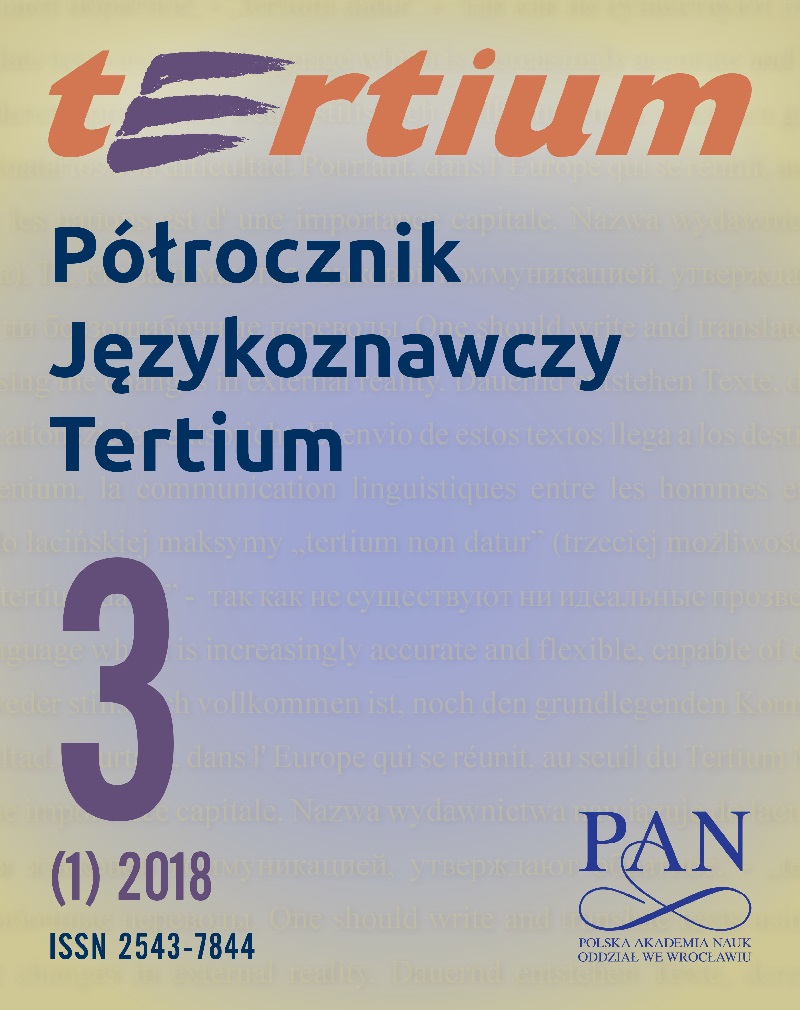Abstrakt
Abstract
The development of the Internet has led to the emergence of new digital genres, also known as cybergenres or web genres. The existing research into diverse web pages has displayed that the new medium not only generated changes in traditional genres (reproduced or adapted) but also created a number of novel genres. The creation, development and nature of spontaneous genres are connected with the evolution of the web since they have no counterparts in traditional media. The present study deals with one of them: it concentrates on the genre analysis of a small corpus of over 30 web pages representing the 404 error message genre, which are automatically generated to indicate that a server cannot find the page requested by a web user who follows a dead or broken link. The paper presents the origins of the genre in question, its structure, content and communicative purposes. The research has been carried out by means of the methodology of genre analysis proposed by John Swales (1990). Four moves that express the communicative purposes of 404 error have been identified and the commonest rhetoric choices have been analyzed. Additionally, the paper presents a selection of unusual, ingenious or funny 404 error pages.
Key words: cybergenres, web genres, 404 error page
Streszczenie
Rozwój internetu doprowadził do powstania nowych gatunków mowy – gatunków internetowych. Dotychczasowe badania nad różnorodnymi stronami WWW ujawniły nie tylko zaistnienie zmian, które dokonały się w tradycyjnych gatunkach mowy za sprawą nowego medium (gatunki reprodukowane i zaadoptowane) ale powstanie szeregu całkowicie nowych gatunków, ściśle powiązanych z ewolucją i właściwościami Internetu, a nie mających swoich odpowiedników w tradycyjnych mediach. Niniejsza praca stanowi przyczynek do badań nad jednym z nich - stroną Błąd 404, automatycznie generowaną przez serwer, który nie może odnaleźć i wyświetlić strony żądanej przez użytkownika. W oparciu o korpus ponad 30 przykładów stron Błąd 404 autor analizuje strukturę, cele komunikacyjne oraz zawartość stron. Analiza zgromadzonego materiału przy zastosownaniu metodologii badań nad gatunkami mowy Johna Swalesa (1990) wykazała obecność czterech posunięć (moves) wyrażajacych cele komunikacyjne oraz najczęściej wystąpujące i najbardziej charakterystyczne sformułowania. Dodatkowo zaprezentowano wybór nietypowych, oryginalnych oraz zabawnych przykładów stron Błąd 404.
Bibliografia
lab [web page] Retrieved from http://queenofsubtle.com/404/ July-December 2017.
“A brief history of 404” 404 lab [web page]. Retrieved from http://queenofsubtle.com/404/?page_id=1921 July 6, 2017.
Askehave, Inger, Anne Ellerup Nielsen (2005) “Digital Genres: A Challenge to Traditional Genre Theory.” Information, Technology & People 18; 120-141.
Crowston, Kevin, Marie Williams (2000) “Reproduced and Emergent Genres of Communication on the World Wide Web.” The Information Society 16; 201-216.
Herring, Susan C. (2012) “Discourse in Web 2.0: Familiar, Reconfigured, and Emergent” [In:] D. Tannen & A. M. Tester (Eds.), Georgetown University Round Table on Languages and Linguistics: Discourse 2.0: Language and new media. Washington, DC: Georgetown University Press. Retrieved from http://info.ils.indiana.edu/~herring/GURT.2011.prepub.pdf Dec. 10, 2017.
Rodrigo, Isabel Herrando (2014) “Genre Evolution in Research Communication in English” Revista Canaria de Estudios Ingleses 69; December 2014; 35-49.
Santini, Marina (2007) “Characterizing Genres of Web Pages: Genre Hybridism and Individualization.” Proceedings of the 40th Hawaii International Conference on System Sciences. Retrieved from https://pdfs.semanticscholar.org/c6e7/beff68eb8f03523d8a64a7f97bc9b915ee5b.pdf Nov.11, 2017.
Shepherd, Michael, Carolyn Watters (1998) “The Functionality Attribute of Cybergenres.” [In:] HICSS Proceedings of the Thirty-second Annual Hawaii International Conference on System Sciences. Vol. 2. Washington, DC: IEEE Computer Society; 97-109. Retrieved from https://web.cs.dal.ca/~shepherd/pubs/evolution.pdf Dec. 3, 2017.
Swales, John (1990) Genre Analysis: English in Academic and Research Settings. Cambridge: Cambridge University Press.
Yates, Joanne, Wanda Orlikowski (1992) “Genres of Organizational Communication: A Structurational Approach to Studying Communication and Media.” Academy of Management Review 17; 299-326.
Yates, Joanne, Wanda Orlikowski (2002) “Genre Systems: Structuring Interaction Through Communicative Norms.” Journal of Business Communication 39, no. 1; 13-35.
Licencja Uznanie Autorstwa- Użycie niekomercyjne-Bez utworów zależnych (CC BY-NC-ND). Autorzy zachowują prawa autorskie do swoich publikacji.

